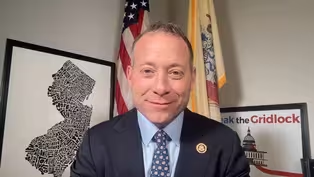NJ Spotlight News
NJ charter school reforms under consideration
Clip: 12/17/2024 | 4m 39sVideo has Closed Captions
Interview: Hannah Gross, education and child welfare writer, NJ Spotlight News
New Jersey's Senate Education Committee held a hearing on Monday to tackle some of the challenges that come along with charter schools, like how to fund them and how to run them. NJ Spotlight News Education and Child Welfare Writer Hannah Gross was at the hearing and shares some of the concerns and suggestions that were raised.
Problems playing video? | Closed Captioning Feedback
Problems playing video? | Closed Captioning Feedback
NJ Spotlight News is a local public television program presented by THIRTEEN PBS
NJ Spotlight News
NJ charter school reforms under consideration
Clip: 12/17/2024 | 4m 39sVideo has Closed Captions
New Jersey's Senate Education Committee held a hearing on Monday to tackle some of the challenges that come along with charter schools, like how to fund them and how to run them. NJ Spotlight News Education and Child Welfare Writer Hannah Gross was at the hearing and shares some of the concerns and suggestions that were raised.
Problems playing video? | Closed Captioning Feedback
How to Watch NJ Spotlight News
NJ Spotlight News is available to stream on pbs.org and the free PBS App, available on iPhone, Apple TV, Android TV, Android smartphones, Amazon Fire TV, Amazon Fire Tablet, Roku, Samsung Smart TV, and Vizio.
Providing Support for PBS.org
Learn Moreabout PBS online sponsorshipWhen it comes to education, there's a ton of uncertainty from a Trump administration that's promised to dismantle the Department of Education to a new funding system in New Jersey that still needs to be formed.
But one area that seems to consistently draw controversy is the topic of charter schools.
The Senate Education Committee held a hearing yesterday to tackle some of the challenges that come along with charter schools, like how to fund them and how to run them.
Education and child welfare writer Hannah Gross was at the hearing.
She's with us now to help us understand some of the concerns and suggestions that were raised.
Hannah, great to have you here in the studio.
Terrific writing on this article that you put out that really outlines a number of challenges that we see come along with charter schools.
One of them was salaries for executives.
What are the concerns there?
I mean, there's been some reporting from NJ.com about unusually high salaries for charter schools that far outpace those of superintendents, especially in smaller districts, because these charter schools often serve at most, a few hundred kids, whereas some school superintendents are serving thousands and being paid a lot less per pupil.
Were there suggestions made as to how to regulate that?
Should there be state regulation?
The Department of Education is supposed to be regulating that and approving contracts for administrators.
But right now there are some concerns coming from lawmakers that the Department of Education is not providing enough oversight.
And maybe because they might be a little bit understaffed right now.
We also heard some testimony about how folks are appointed to boards.
We know that in public schools, that's an electoral process.
What do we see in charter schools and could that be problematic?
Charter school leaders get to pick who serves on their boards of trustees.
And there were some concerns that there's not enough accountability there, because in traditional public schools, if people in a community don't like what the board is doing, they can just vote them out at the next election.
But you don't have that same level of accountability coming from the public in the charter schools.
Not surprising.
We heard charter schools asking for more funding.
It's something we hear quite a bit and we see them continually tout their success.
What did you hear in terms of touting that success?
And we're going to get into maybe perhaps some of the problems in that.
Yes, the charter schools we're talking about, the success they saw from the most recent round of statewide standardized test scores performing above average for black and Latino and economically disadvantaged students in both math and language English language arts across grade levels.
But some of the researchers who testified pushed back on those findings and said it might not be the best idea to compare charter school scores directly to traditional district scores because the student populations are not exactly the same.
And charter schools tend to serve less multilingual learners and students with disabilities than traditional district schools.
It's been a criticism we've heard where they basically say they get to cherry pick the students that they want because these are not students, as you said, coming in with disabilities or learning challenges in the same way we see in the public schools.
Is that a fair criticism that they cherry pick.
People from the charter school sector and lawmakers push back on that?
They're not allowed by law to cherry pick their students.
A lot of these schools have lottery systems with students on waitlists, but the student populations do sometimes end up looking a little bit different from the communities that are sending kids to the charter schools.
And yet there was testimony yesterday from a researcher, I believe it was from Stanford University, who did a really interesting kind of deep dive side by side comparison of students in public schools, students in charter schools.
What did that researcher inform everyone of?
The researcher found that charter schools are getting a little bit better each year and attributed that possibly to the fact that they're on five year contract a lot of the time.
So they have to keep pushing to be better if they want to stay open.
And they've also added more school days over the last 15 years, about 22 days per year and instructional time, whether that's from longer school days or longer school years.
Do you expect any real meaningful change to come from this hearing?
It's hard to say.
It looks like legislation is going to be introduced next year, but to find something that all of the different stakeholders can agree on and can get passed by both houses and signed by the governor might be tough for it to be so sweeping.
But this law was last passed in 1995.
So people do agree that it's time for another look.
All right.
Great reporting, as always.
Hannah Gross education and child welfare writer.
Thank you.
Thanks, Joanna.
Gottheimer wants more muscle for state, local drone response
Video has Closed Captions
Clip: 12/17/2024 | 5m 15s | Rep. Josh Gottheimer proposes legislation to give law enforcement more tools (5m 15s)
NJ bill would ban pre-approval from health insurance
Video has Closed Captions
Clip: 12/17/2024 | 4m 48s | New law will reduce pre-authorization delays in some cases, lawmakers pressing for more (4m 48s)
Poll suggests some optimism about second Trump term
Video has Closed Captions
Clip: 12/17/2024 | 4m 33s | Monmouth Poll shows 53% of respondents optimistic about Trump's policies (4m 33s)
Providing Support for PBS.org
Learn Moreabout PBS online sponsorship
- News and Public Affairs

Top journalists deliver compelling original analysis of the hour's headlines.

- News and Public Affairs

FRONTLINE is investigative journalism that questions, explains and changes our world.












Support for PBS provided by:
NJ Spotlight News is a local public television program presented by THIRTEEN PBS


